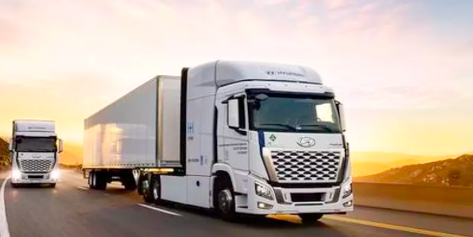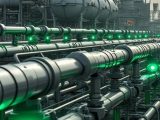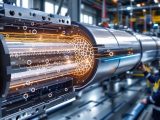
Hyundai Translead Named Exclusive Distributor for XCIENT Trucks in North America
October 27, 2025Have you caught that low-key buzz at your local freight yard lately? On October, 2025, Hyundai Translead scored the exclusive North American rights to distribute Hyundai’s XCIENT Fuel Cell Trucks. With fleets under serious pressure to slash emissions and hit tougher air quality rules, this move could be a real game-changer for hydrogen fuel cells and zero-emission technology.
Streamlined Solutions: From Trailer to Truck
For over thirty years, Hyundai Translead has been the go-to for dry van trailers, refrigerated units, truck bodies, chassis and dollies. Based in San Diego, CA and founded in 1989, they now command the biggest slice of the North American market for trailers. By adding heavy-duty hydrogen trucks to their lineup, they’re turning into a one-stop shop—handling sales, maintenance and parts logistics all under one roof. Fleet managers can finally ditch the vendor juggle and lean on a single partner.
Why North America Is Primed for Hydrogen
The U.S. isn’t just the world’s biggest economy—it’s a freight juggernaut, hauling billions of tons every year. But regulators are cranking up the heat on greenhouse gases. From California’s Advanced Clean Fleets rule to Georgia’s Clean Truck Plan, carriers are being nudged toward industrial decarbonization. At the same time, federal perks in the Inflation Reduction Act and DOE grants are lowering the bar for clean-truck adoption. Hydrogen, with its super-quick refuels and long range, is tailor-made for routes that don’t pause. And with Translead as your single point of contact, those adoption hurdles shrink even more.
Global Track Record of the XCIENT Fuel Cell
Hyundai Motor Company first rolled out the XCIENT Fuel Cell in Switzerland as a pilot back in 2020. Since then, over 3,500 fuel cell commercial vehicles have hit the road worldwide, including more than 250 heavy-duty XCIENT units. In North America alone, 35 trucks are cruising under the NorCAL ZERO Project and EPA’s Targeted Airshed Grants in California, while another 21 are powering logistics networks in Georgia. Together, they’ve chalked up over 13 million kilometers—proof that operators trust hydrogen fuel cell fleets.
Under the Hood: How the Technology Delivers
So, what makes the XCIENT tick? It packs high-pressure hydrogen tanks feeding a fuel cell stack that blends hydrogen with oxygen to generate electricity—no combustion, just pure propulsion and water vapor exhaust. This direct electrical drive delivers steady torque and often exceeds 500 miles on a single fill. And unlike battery-electric rigs, you can top up in under 30 minutes, which is huge for time-sensitive hauls. Fewer moving parts also mean simpler maintenance, so fleets spend more time rolling and less time in the shop.
Scaling Hydrogen Infrastructure
Of course, you need places to refuel. In California, programs from the California Energy Commission and CARB have added over 50 hydrogen stations since 2018. Down in Georgia, a mix of state grants and public-private partnerships is targeting new fill-up spots along I-75 and I-85 by 2026. By tapping into Translead’s dealer network, hydrogen suppliers can strategically roll out stations near major depots, easing range anxiety and bolstering the overall hydrogen infrastructure.
Partners, Grants and Collaborations
The XCIENT launch leans on a web of public-private teamwork. In California, the NorCAL ZERO Project—backed by CARB and EPA Targeted Airshed funds—deployed 35 trucks to regional carriers. Georgia’s clean-air programs chipped in on the upfront costs for 21 vehicles. These partnerships de-risk the early bets and show how grants can kick-start deployment. With Translead in the mix, we could see even tighter coordination where funding, refueling and procurement move in lockstep.
Impact on Fleet Operations
From the fleet’s perspective, the XCIENT’s predictable “pit stops” and lower maintenance needs are a breath of fresh air. Drivers used to diesel slide right into the familiar cab layout, and maintenance crews who know trailers can pick up hydrogen trucks with just a bit of extra training—no massive relearning curve. That means fewer breakdowns, more miles on the road and a healthier bottom line.
A Strategic Play for Decarbonization
This isn’t merely a distribution agreement; it’s a tactical push to turbocharge the shift to sustainable energy in heavy transport. Diesel still dominates logistics emissions, and while battery electrics have their place, long-haul routes need something different. By pairing trailers with hydrogen fuel cell powertrains, Hyundai and Translead hope to break the market’s inertia. Fleets keep a reliable service partner, and policymakers see real strides toward industrial decarbonization goals.
Where Hyundai Stands in the Competitive Landscape
Hyundai’s play echoes moves by Toyota, Nikola and Daimler, all racing to build their own hydrogen ecosystems. But Hyundai has an edge: its trailer business is a trusted brand in North America now coupled with advanced fuel cell tech. Competitors are still sketching out their distribution networks, while Hyundai already has a clear runway. And with green hydrogen costs trending downward, analysts expect total cost of ownership to rival diesel by decade’s end.
Looking Toward 2030 and Beyond
What’s next on the horizon? Expect Translead to roll out demo days at key freight hubs, launch flexible leasing deals and beef up its parts inventory with fuel cell components. On the regulatory front, more states may unveil zero-emission mandates for heavy vehicles. If hydrogen hits price parity sooner, we could see order volumes spike as early as 2027. For now, California and Georgia are the frontrunners, but this partnership could spark wider adoption across the U.S. and Canada.
The Role of Hydrogen in Decarbonizing Industry
Hydrogen fuel cells are branching out beyond trucking into buses, material handling and even stationary power. The know-how gained from heavy-duty deployments spills over into these applications, fueling innovations in hydrogen production and storage. Massive electrolysis projects in Texas and the Gulf Coast are ramping up, promising more green hydrogen at lower prices. If economies of scale kick in, trucking will just be the opening act in a grand sustainable energy performance.
About the Companies
Hyundai Translead is North America’s leading van trailer manufacturer, specializing in dry and refrigerated units, truck bodies, chassis and dollies. Founded in 1989 and headquartered in San Diego, CA, it now serves as the exclusive distributor of Hyundai XCIENT Fuel Cell Trucks in North America.
Hyundai Motor Company, based in Seoul, South Korea, is a global automotive leader. Since 2020, it has delivered over 3,500 fuel cell-powered commercial vehicles worldwide, collaborating with public and private partners to advance clean transport.



 With over 15 years of reporting hydrogen news, we are your premier source for the latest updates and insights in hydrogen and renewable energy.
With over 15 years of reporting hydrogen news, we are your premier source for the latest updates and insights in hydrogen and renewable energy.